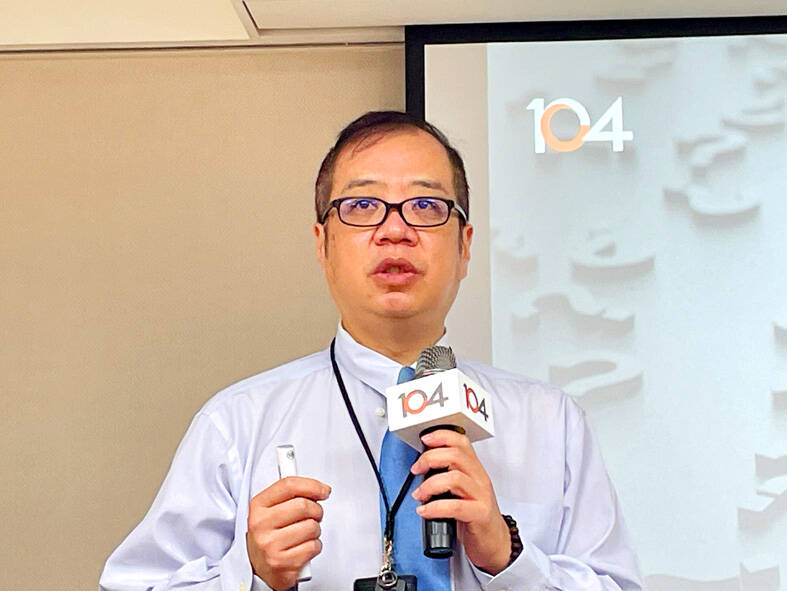The average yearly wage in Taiwan has risen to a seven-year high of NT$677,000 (US$21,689) this year, as inflation and labor shortages have spurred companies to raise overall compensation, online human resources platform 104 Job Bank (104人力銀行) said yesterday.
The figure represents a 3.1 percent hike from a year earlier, with semiconductor manufacturers topping the survey with an average annual wage of NT$969,000, followed by telecoms at NT$841,000 and electronics suppliers at NT$820,000, the job bank said.
Despite excess capacity in the semiconductor sector in the second quarter, the industry has been in a favorable position for at least three years and remains highly profitable, 104 Job Bank consultant Stanley Hua (花梓馨) told a news conference in Taipei.

Photo: Ou Yu-hsiang, Taipei Times
That position, coupled with a persistent brain drain that has driven companies to compete for talent by offering higher salaries sometimes across borders, has resulted in the semiconductor sector offering the highest average pay, he said.
That explains why integrated circuit (IC) design engineers enjoy the highest average annual salary at NT$1.37 million, followed by digital IC engineers at NT$1.28 million and IC layout engineers at NT$1.08 million, the job bank said, adding that such firms have raised wages and perks to recruit and retain talent to meet technology upgrade and capacity expansion needs.
However, the average pay in the financial sector is expected to decline 7.9 percent this year, due to insurance companies paying compensation to people who purchased COVID-19 policies and falling turnover on the Taiwan Stock Exchange, which is down 31 percent year-on-year, the job bank said.
The average annual wage in the electronic components manufacturing sector is expected to fall 2.6 percent due to an economic slowdown and 1.9 percent in the construction sector due to falling property sales caused by rising interest rates, it said.
Meanwhile, 95.9 percent of Taiwanese firms plan to distribute year-end bonuses equivalent to 1.33 months of wages, the job bank said, adding that the figure is 0.23 months higher than the amount recorded last year.
The survey showed that 49.1 percent of Taiwanese firms are looking at business decline next year and only 23.5 percent hold positive views.
The job bank cited an economic slowdown at home and abroad as the main drag on business sentiment.
Some firms expect a recovery to take place in the third quarter of next year, but others believe the downturn would persist until the fourth quarter, it said.
Additional reporting by CNA

TAKING STOCK: A Taiwanese cookware firm in Vietnam urged customers to assess inventory or place orders early so shipments can reach the US while tariffs are paused Taiwanese businesses in Vietnam are exploring alternatives after the White House imposed a 46 percent import duty on Vietnamese goods, following US President Donald Trump’s announcement of “reciprocal” tariffs on the US’ trading partners. Lo Shih-liang (羅世良), chairman of Brico Industry Co (裕茂工業), a Taiwanese company that manufactures cast iron cookware and stove components in Vietnam, said that more than 40 percent of his business was tied to the US market, describing the constant US policy shifts as an emotional roller coaster. “I work during the day and stay up all night watching the news. I’ve been following US news until 3am

UNCERTAINTY: Innolux activated a stringent supply chain management mechanism, as it did during the COVID-19 pandemic, to ensure optimal inventory levels for customers Flat-panel display makers AUO Corp (友達) and Innolux Corp (群創) yesterday said that about 12 to 20 percent of their display business is at risk of potential US tariffs and that they would relocate production or shipment destinations to mitigate the levies’ effects. US tariffs would have a direct impact of US$200 million on AUO’s revenue, company chairman Paul Peng (彭雙浪) told reporters on the sidelines of the Touch Taiwan trade show in Taipei yesterday. That would make up about 12 percent of the company’s overall revenue. To cope with the tariff uncertainty, AUO plans to allocate its production to manufacturing facilities in

Six years ago, LVMH’s billionaire CEO Bernard Arnault and US President Donald Trump cut the blue ribbon on a factory in rural Texas that would make designer handbags for Louis Vuitton, one of the world’s best-known luxury brands. However, since the high-profile opening, the factory has faced a host of problems limiting production, 11 former Louis Vuitton employees said. The site has consistently ranked among the worst-performing for Louis Vuitton globally, “significantly” underperforming other facilities, said three former Louis Vuitton workers and a senior industry source, who cited internal rankings shared with staff. The plant’s problems — which have not

COLLABORATION: Given Taiwan’s key position in global supply chains, the US firm is discussing strategies with local partners and clients to deal with global uncertainties Advanced Micro Devices Inc (AMD) yesterday said it is meeting with local ecosystem partners, including Taiwan Semiconductor Manufacturing Co (TSMC, 台積電), to discuss strategies, including long-term manufacturing, to navigate uncertainties such as US tariffs, as Taiwan occupies an important position in global supply chains. AMD chief executive officer Lisa Su (蘇姿丰) told reporters that Taiwan is an important part of the chip designer’s ecosystem and she is discussing with partners and customers in Taiwan to forge strong collaborations on different areas during this critical period. AMD has just become the first artificial-intelligence (AI) server chip customer of TSMC to utilize its advanced